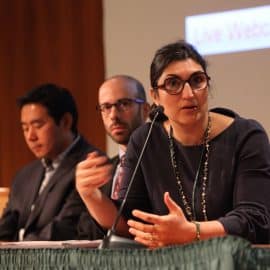


| Personal Brand Presence | 6 / 10 |
| Authoritativeness | 6 / 10 |
| Expertise | 7 / 10 |
| Influence | 5 / 10 |
| Overall Rating | 6 / 10 |
Elham Tabassi is the Associate Director for Emerging Technologies in the Information Technology Laboratory (ITL) and a Senior Research Scientist at the National Institute of Standards and Technology (NIST). In addition, she oversees NIST’s initiative for Responsible and Trustworthy AI, which tries to foster confidence in the creation, application, and usage of AI technology.
Elham supports NIST leadership and management at all levels in deciding on the future strategic direction for research, development, standards, testing, and assessment in the fields of emerging technologies including artificial intelligence in his capacity as the ITL’s Associate Director for Emerging Technologies. She also arranges interactions pertaining to artificial intelligence between other government agencies, the worldwide standards community, the American industry, and research groups in the United States.
Since joining NIST in 1999, Elham has worked on a variety of machine learning and computer vision research projects with applications in the assessment and standards of biometrics. She is a fellow of the Washington Academy of Sciences, an associate editor of the IEEE Transaction on Information Forensics and Security, vice-chair of the OECD working group on AI Governance, and a member of the National AI Resource Research Task Force.
Elham Tabassi is considered one of the leading pioneers, leaders, thinkers, and shapers in the field of AI development and transformation. Tabassi is recognized for her contributions to the creation of reliable and ethical AI systems as well as for her leadership in the creation of NIST’s AI Risk Management Framework (AI RMF 1.0), which was made available in January 2023. Both governmental and commercial sector groups have heaped accolades on the AI RMF.
Solana has demonstrated strong performance, driven by increasing adoption, institutional interest, and key partnerships, while facing potential ...
Know MoreIn April 2025, the crypto space focused on strengthening core infrastructure, with Ethereum preparing for the Pectra ...
Know More